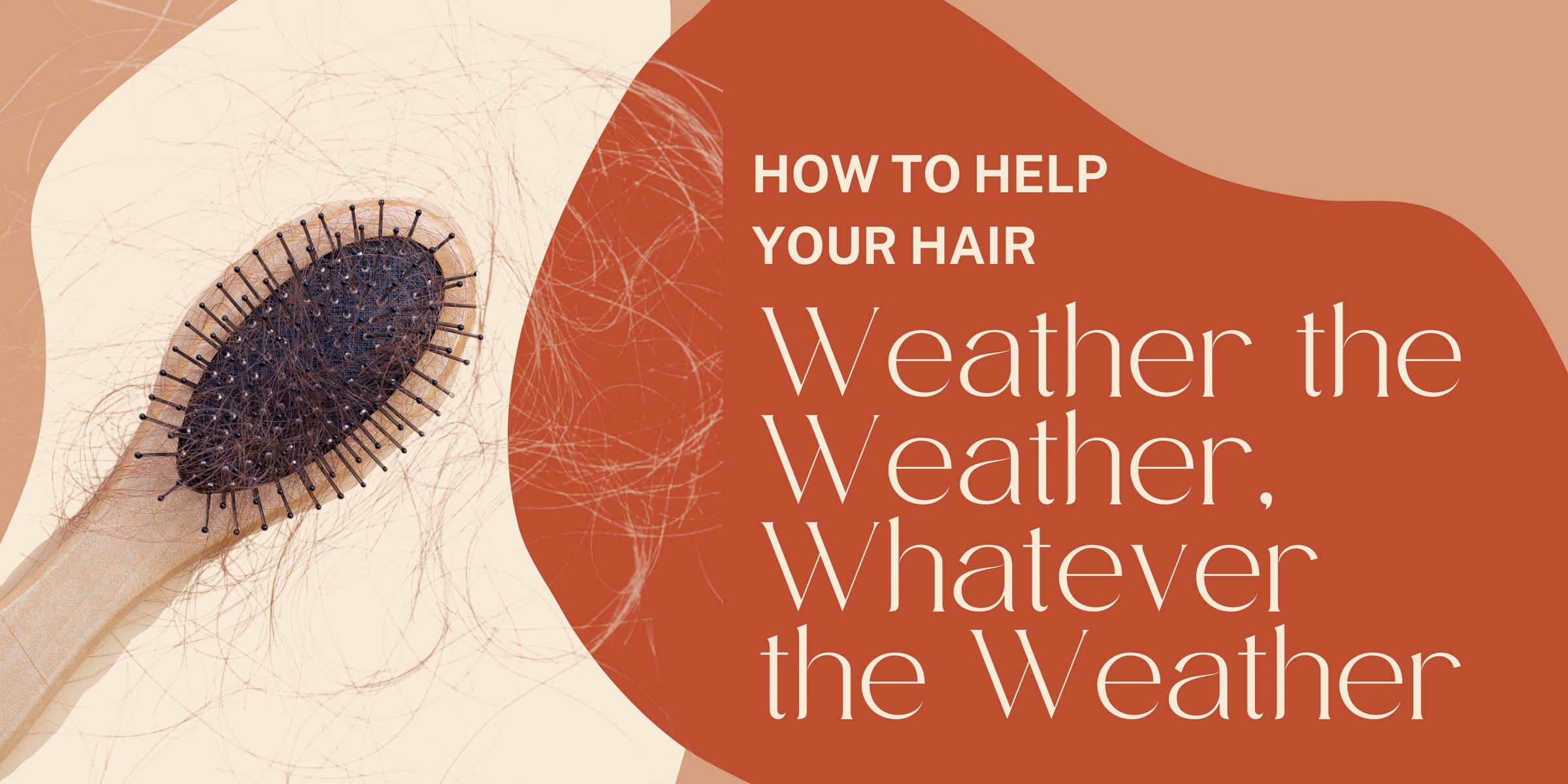How To Help Your Hair Weather the Weather, Whatever the Weather
Keeping your hair shiny & luscious throughout the seasons requires more than umbrellas and swimming caps. Your scalp needs different care depending on the weather.
Just like you may need to change up how often you wash your face, the type of moisturizer you use, the sun protection you apply, and your foundation shade… Your scalp needs similar adjustments. It’s skin too!
“If your face dries out in the winter, you can expect your scalp to as well,” says Vigor Roots Founder Nathalee DuRose.
Remember, healthy, beautiful hair is rooted in a healthy, cleansed, & moisturized scalp.
Let’s walk through how to protect your scalp and your hair as the weather changes throughout the seasons.
How Humidity & Rain Affect Your Hair
If you’ve ever noticed your hair getting extra curly when you’re at the beach or if you’ve ever been a cloud of frizz after running from the cab to the door in the rain, you’re probably aware that the moisture in the air affects your hair.
Quick science lesson: hair strands are actually bundles of tubes of keratin that are bonded together. Strong disulfide bonds are responsible for your hair type: more disulfide bonds, more curls! You can’t break these up unless you permanently straighten or curl your hair.
The weaker hydrogen bonds, which give hair its elasticity, are broken by water and reset when the hair dries. Heat can also break and reset your hair’s hydrogen bonds. This is why you can temporarily change the shape of your hair by using a flat iron, curling iron, blow dryer, curlers, etc. And why getting your hair wet again washes away your styling.
When it’s humid, the water molecules in the air bind to the hydrogen in your hair strands, increasing the number of hydrogen bonds- causing the hair to bend and bind to itself or other hair strands. Hence, wayyyy more curl.
OK, back to what happens to your hair when it’s humid out.
Whenever your hair gets wet, the strands swell as the hydrogen bonds break, and redry as new hydrogen bonds form to hold your hair in its new (temporary) shape. That’s why humidity tends to make our hair big.
What To Do When It’s Humid or Rainy
To really fight the frizz you have to:
- Prevent excess, environmental moisture from reaching the hair strands.
- Prevent hair from redrying in a weird shape. (Once the frizz sets in, it’s hard to get rid of it before your next wash.)
For Step 1:
- Upgrade your shampoo, conditioner, & other hair products to high-quality, natural formulas that do not strip the scalp of its natural, protective oils that repel water. (Sulfate-free, please!)
- Apply a barrier to environmental moisture such as serum, hair oil, cream, or leave-in conditioner.
- Keep your hair hydrated & moisturized, to prevent it from soaking in excess moisture from the environment. To do this, use hair care products that allow the strands to absorb moisture rather than simply coating the follicles. Look for humectants, or ingredients that pull moisture from the air like aloe vera, Hyaluronic acid, glycerin, and honey. Watch out for oil-heavy products and dimethicone.
- Use an umbrella or keep your hair covered when you go out in the rain.

For Step 2:
- Be real gentle with your hair so you don’t disrupt the texture.
- Wear your silk bonnet to bed.
- Don’t rub your hair with a rough towel to dry it, gently pat & squeeze it with a gentle fabric instead.
- Consider a protective style like braids or twists during humid seasons. Despite the moisture in the air, these styles will hold your hair in place so the strands can keep resetting their hydrogen bonds in a pleasing shape. Don’t forget to keep using a scalp moisturizer though!
- If you’re in a super humid climate, go with a natural style over a heat-styled one. The heat styling is unlikely to stick in high humidity.
How Cold, Dry Weather Affects Your Hair
In the cold, dry winter, your Number 1 concern is keeping your hair and scalp hydrated and moisturized.
Cold weather plus central heating is a recipe for stripping the moisture from your hair and leaving it brittle and breakable.
But never fear, an itchy scalp winter is not an inevitability. You’re not doomed to frizz and split ends. It doesn’t have to be this way! Just amp up the moisturizing!
Apply a nourishing scalp serum more frequently than in the summer months, and increase how often you get a deep treatment. You may want to start doing weekly or bi-weekly deep treatments if you tend to suffer from dry scalp in the winter.
But, if your scalp is feeling dry and itchy, do not, I repeat DO NOT assume the solution is just to wash more frequently. This can actually cause your scalp to dry out more by stripping it of its natural, protective oils- leaving your skin irritated and flaky.
“If you’re having scalp problems, the answer is not to just wash your hair every day,” DuRose says.
Since the purpose of shampoo is to strip the scalp of dirt, sweat, and product residue- over-shampooing can actually start stripping your hair strands of their protective outer layers- inviting in frizz and split ends. You may even want to consider just rinsing with water and conditioning (no shampoo) every other wash.
How To Keep Your Hair & Scalp Moisturized In The Winter
- Apply a nourishing, moisturizing scalp serum more frequently.
- Get a deep treatment at least monthly- but preferably weekly or biweekly.
- If your indoor heating is drying out your living space or office, consider a humidifier to put moisture back in the air.
- Remember to drink plenty of water.
- Try to go longer between wash days.
- Air dry rather than blow dry. Your hair gets to keep more moisture that way. Just don’t go out in the freezing cold with wet hair.
- Avoid heat styling- but if you must, use a heat protectant.
- Cover your hair when you go out in the cold to prevent the moisture from being sucked from your hair. Just make sure to line your hats with silk or satin since hair tends to snag on wool and textured fabric.
What to Do in Hot, Dry Weather
In any dry weather, your #1 priority is still hydration & moisturizing.
So, if your scalp is feeling dry in dry heat, amp up that moisturizing routine by applying your scalp serum several times a week and a deep treatment several times a month.
If your scalp is oily, don’t worry so much about moisturizing- but don’t start overwashing.
Rev up the humidifier, drink water, and consider investing in a good sunscreen for your hair and scalp to protect yourself- and your hair color (even if you haven’t dyed!)- from UV damage.
And while we don’t recommend frequent shampooing, when it is a wash day, make sure you apply the shampoo to your scalp - not just your hair- so it can do it’s job.
“A lot of people wash their hair but don’t wash their scalp, but it’s so important to cleanse the scalp,” says DuRose.
Adjusting Your Scalp Care Routine With the Weather
Just like you adapt your skincare routine to accommodate the change of the season, check in on whether your hair and scalp routines need some adjustments as well.
Taking care of your scalp seasonally usually doesn’t require anything drastic, just adjusting the frequency of how often you moisturize your scalp and get deep treatments, and making sure you’re washing enough to keep your scalp clean but not so frequently you’re drying it out and stripping your hair.
You got this. You deserve a healthy scalp & luscious hair year round.

We’re here to help. Get yourself the best scalp serum on the market and make sure to signup for our newsletter so you'll be first to know when new products drop!

